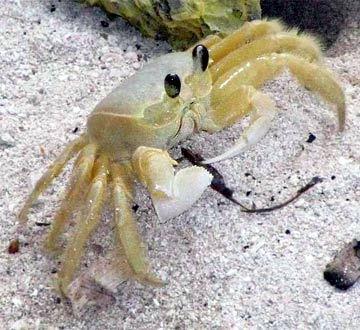(单词翻译:单击)
听力文本
And the Belizean white crab is another creature that is unique to just one cave system.
而伯利兹白蟹是另一个洞穴生态系统中的特有物种
Living in perpetual darkness, they have all not only lost the pigment in their skin but also their eyes.
由于一直生活在黑暗之中,它们不仅失去了皮肤色素,眼睛也退化了。
It takes thousands of generations for eyes to be lost
眼睛的退化需要经历数千代的演变
so these species must have been isolated for a very long time.
所以这些物种必定与世隔绝了相当长的一段时间
But the blind salamander has other highly-developed sensory organs.
不过这些瞎眼的蝾螈进化出了其它发达的感觉器官
Receptors in the skin detect minute movements in the water made by its prey.
皮肤上的探测器能觉察到猎物引起的最微小的水流变化

External gills help it to breathe in water that is particularly low in oxygen.
外生的鳃帮助它们在极度缺氧的水中呼吸
The cave angel fish feed on bacteria in the fast-flowing water,
洞穴天使鱼以急流中的细菌为食
keeping their grip with microscopic hooks on their fins.
它们用鳍上的小钩紧紧抓住岩壁
Food is often in short supply
食物总是很紧缺
and troglobites, like the crab, have to survive on whatever washes into the cave from outside.
像螃蟹这样的穴居动物必须得吃任何从外边冲进洞内的东西
A salamander might not encounter food for several months,
童态河溪螈可能已有几个月没有吃东西了
so when something does come along, it can't afford to miss it.
所以只要眼前有食物出现,它绝对不会放过。
视频及简介
洞穴是不受阳光控制的生物栖息地之一,但这并不意味着那里就不存在野生生物。本集节目将深入洞穴内神秘而永恒的黑暗,探索山洞、洞穴和隧洞中未知的地下世界。


